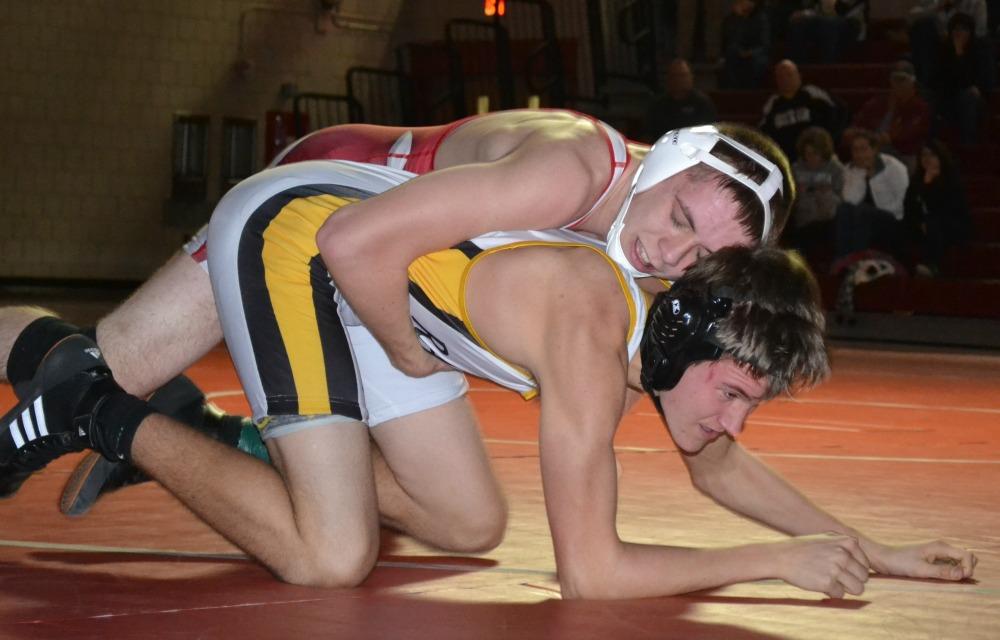Each sport has its own unique way of scoring points and winning games. In hockey and soccer, if a puck or ball goes in the net, a point is earned. In basketball, players gain points by getting the ball to travel into the small rimmed metal circle lined with rope commonly referred to as a net. After touching four plates, athletes achieve a run in both softball and baseball. Wrestling is a very unique sport because the scoring system is a much more complicated endeavor.
To begin, one must understand that wrestling is both an individual and team event.
“You should know your team’s points so you know what to do in your match,” Senior Brandon Smart said. When an individual pins his opponent, the team will earn six points. Winning the match is achieved in one of two ways. One method is if one player pins the other by forcing his opponent’s shoulders to the mat and the other method is determined by individual points earned.
The athletes are given three two-minute periods to pin. If this goal can’t be accomplished, the winner will be determined by the points earned throughout the individual match.
How can someone earn points if there is no obvious evidence like downed shoulders, touching a base, or getting an ball into a net? Again, there are numerous ways to achieve points. If one wrestler can take his opponent off his feet in one swift motion, it is considered a “take-down,” and the one who performed the action receives two points.
If this player is able to get the opponent onto his back for two seconds or more without pinning, they can earn points; if the hold lasts two to four seconds before the opponent gets out of the position, two points are given. If this hold lasts for five or more, three points are given. This is known as “nearfalls” or “backpoints.”
In that situation, the wrestler who was nearly pinned earns points as well. Why? This is because they had the ability to break away from the opponent’s grasp and get off his back. From this, they will earn one point for an “escape.” When a wrestler breaks from the grasp of the other, he gains control and has the upper hand, he will earn a “reversal” for two points.
Because this sport is so rough, players can get themselves into some dangerous situations and holds. In order to discourage this from happening, referees will add points to the athlete’s score who didn’t commit the penalty, a “penalty point.”
“[We] always look at the scoreboard,” Senior Matt Pavlick said. Sometimes the boys get ahead of themselves during individual matches, misjudge their personal points and don’t try as hard to pin their opponents. This has happened to Pavlick and others which is why he finds it so important.
At the end of an individual match where neither wrestler was pinned, not only will the points earned determine the winner, it will also dictate how many points are awarded to the team. Contrary to popular belief, this is not considered a “typical” pin earning six points, nor will it earn the difference between the opponents. Instead, there are three point groupings that will ascertain three, four or five points. These wins are called “decision,” a difference of seven points or less, “major decision,” a difference of eight to 14 points, and “technical faults,” a difference of fifteen points or more, respectively.
On Jan. 8, Pavlick didn’t pin his opponent, but he did win the match. To earn his victory, he scored two points from a takedown in the first period. In the second period, he got a reversal, two points, earned three backpoints, and got a penalty point from his opponent’s locked hands totaling six points for this period. In the final period, he got another takedown and earned three more backpoints. His opponent didn’t score any points during this match, ending in a score of 13-0, therefore winning on a major decision, giving the team four more points.
“It’s a pretty good system. It’s pretty solid,” Pavlick said. The system is an appropriate representation for the actions of these boys. Although most of the boys have won the majority of their matches, some don’t care for the points, but really just want to wrestle.
“You win and you win. You lose and you lose; points don’t matter,” Senior Eann Shaw said.
Wrestling: Winning in more than one way: Guide to scoring a wrestling match
Sophomore Levi Bonzo wrestles a student from Southside in a match on Jan. 15.



